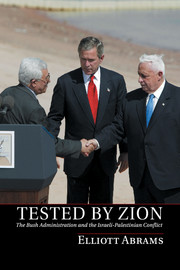Book contents
- Frontmatter
- Contents
- Acknowledgments
- Introduction
- 1 Early Days
- 2 9/11 and the Search for a Policy
- 3 Roadmap to Disengagement
- 4 “New Realities on the Ground”
- 5 Arafat, Disengagement, Sharon
- 6 Olmert – Peace or War?
- 7 War in Lebanon – and Condi
- 8 From Mecca to Annapolis
- 9 The “Meeting” at Annapolis
- 10 Two Trips to Jerusalem
- 11 Final Days in Gaza and Turtle Bay
- 12 Lessons Learned
- 13 Conclusion
- Index
- References
9 - The “Meeting” at Annapolis
Published online by Cambridge University Press: 05 January 2013
- Frontmatter
- Contents
- Acknowledgments
- Introduction
- 1 Early Days
- 2 9/11 and the Search for a Policy
- 3 Roadmap to Disengagement
- 4 “New Realities on the Ground”
- 5 Arafat, Disengagement, Sharon
- 6 Olmert – Peace or War?
- 7 War in Lebanon – and Condi
- 8 From Mecca to Annapolis
- 9 The “Meeting” at Annapolis
- 10 Two Trips to Jerusalem
- 11 Final Days in Gaza and Turtle Bay
- 12 Lessons Learned
- 13 Conclusion
- Index
- References
Summary
On August 1 we were in Israel again, and the meetings once again struck me as miserable. First Rice met with Barak, who cautioned wisely that despite our desire to help Abbas and Fayyad succeed against Hamas, we should recognize our limits. We cannot pretend we can decide the internal struggle for power and legitimacy among the Palestinians, he told Rice and our party. Crossing some subtle lines would hurt them – they would seem to sit on our bayonets. Abu Mazen and Fayyad hold pens; we need people ready to kill and be killed. Dahlan had five times the number of fighters, but Hamas was ready to fight and shoot and die.
All this seemed sensible to me, but it set Rice off. Over time, I became at least as frustrated with Barak as she did because it became clear that he was thoughtful but completely indecisive about the West Bank. Whatever move we asked for, such as removing a roadblock here or a checkpoint there to allow the Palestinians additional mobility, would always be taken under careful consideration, reviewed, studied seriously – and never done. But this meeting was held just weeks after the Hamas coup and the announcement of the coming international conference, and Barak's advice seemed interesting and correct to me. Condi saw it as immobilism. This is the best Palestinian government you will have in your generation, she told Barak. Palestinian political life is radicalizing, and if you don't help these guys succeed, it will not be Hamas you are facing but Al Qaeda. The window is closing for those Palestinians who believe in the two-state solution. If there is no way out, it will radicalize. This is just what was happening under segregation in Alabama when I was growing up, she said; if the moderates cannot pull it off, the radicals will move in. So you must think bigger with this government.
- Type
- Chapter
- Information
- Tested by ZionThe Bush Administration and the Israeli-Palestinian Conflict, pp. 244 - 261Publisher: Cambridge University PressPrint publication year: 2013



